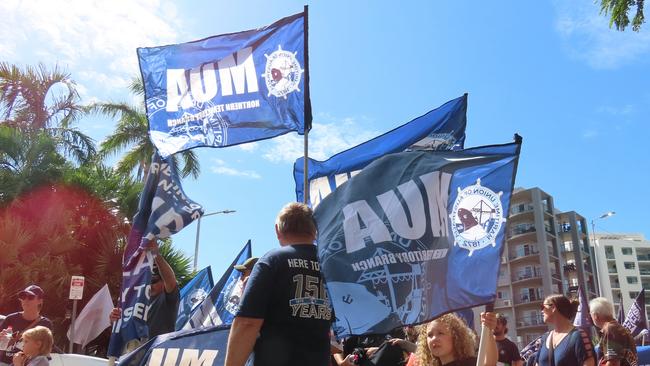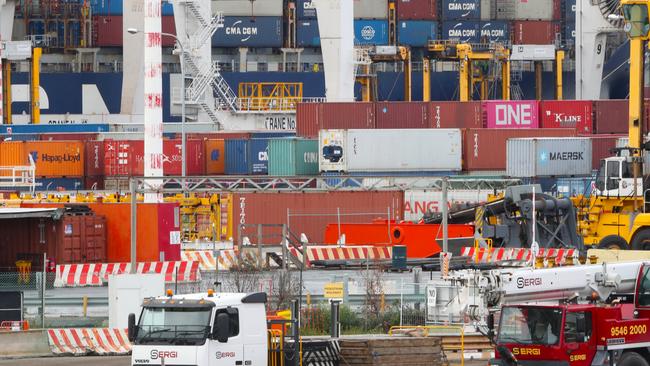Mike O’Connor: Union wharfies on $170k a year hold nation to ransom
OPINION: One union can sit back and effectively shut down the country’s ports at an estimated cost of $84m a day and the Albanese government reckons that’s just fine, writes Mike O’Connor.
Mike O'Connor
Don't miss out on the headlines from Mike O'Connor. Followed categories will be added to My News.
Those students who turned up for the new school year without their uniforms on Monday can thank the Maritime Union of Australia.
The uniforms are in a shipping container, one of the 50,000 or stacked on wharves around the country due to industrial action by the MUA as it demands pay increases for its members employed by stevedoring company DP World.
The uniforms, at least, are not perishable unlike the contents of other containers or critically needed such as the pharmaceuticals packed in others but it’s all the same to the MUA, which is happy to hold the nation to ransom as it demands more money for some of the most highly paid workers in the country.

Wharfies have long been seen as part of the national tapestry of dinky-di Australian characters – blue-singleted, hard working, hard-drinking men slinging bags of wheat over their shoulders as they toil in the sweltering holds of ships.
These days they sit in the airconditioned cabins of cranes and enjoy some of the best working conditions in the world in an industry where the average pay is about $170,000 a year.
This is clearly inadequate and the DP World workers want a 16 per cent pay increase.
Enough, of course, is never enough.
The justification for their industrial campaign is that workers at Patricks stevedoring earn more than they do.
That’s because Patricks workers are more efficient and shift more containers over a given period than they do at DP World. More pay for greater efficiency?
This is not a creed that the MUA, which – with its sister union the notorious CFMEU being one of the most aggressive industrial organisations in Australia – is about to embrace.


We are, as all good Australians will be reminded on Friday, a nation girt by sea, a fact underlined by Defence Minister Richard Marles in announcing our pathetic response to a US call for support in keeping international shipping lanes open in the Red Sea.
We were asked to send a ship and we sent two naval officers.
Australia, Marles said, as an island nation was dependent on sea trade but this being the case, why is the movement of cargo through our wharves not a national priority?
There seems little point in ships arriving if they can’t unload their cargo, but we are dealing with a powerful union that provides significant financial support to the Labor Party so what to do?
The Albanese response, to no one’s particular surprise, has been to do absolutely nothing.
The response of Industrial Relations Minister Tony Burke, who has been flat out like a lizard drinking ticking off items on the union movement’s wish list since being appointed, was to dust down the classic Labor Party ploy titled Class Warfare.

DP World was an overseas company, he said, as if this said all that needed to be said.
If it was foreign, it must be evil.
What is worse is that it makes a profit. It was, Burke said, “one of the most profitable businesses in the world”.
In 2022, Dubai-based DP World made a global profit of US$1.2bn.
Our very own Commonwealth Bank made $10bn. Does this mean it oppresses its workers as they slave away in its dark satanic mills?
Apparently not, but then Comm Bank doesn’t employ any MUA members.
The MUA, then, can sit back and effectively shut down the country’s ports at a cost estimated to be $84m a day and that’s just fine.

The lack of courage and leadership being shown by the government here is truly frightening.
It is supposed to be doing its best to bring down the cost of living, but sits back and watches a situation develop that can only push up prices.
Australian Retailers Association chief executive Paul Zahra said it was “deeply concerning” and that his retailers were starting to suffer stock shortages.
“At the front line, we’re experiencing significant stock issues,” he said.
“Retailers are doing their best not to pass on any costs, but of course, when supplies are reduced, prices will go up.
“There will be a cost to this.”
There will be a cost and it will be borne by families who can least afford it.
There may be also be another cost, one felt at the ballot box by the government at the next election.





